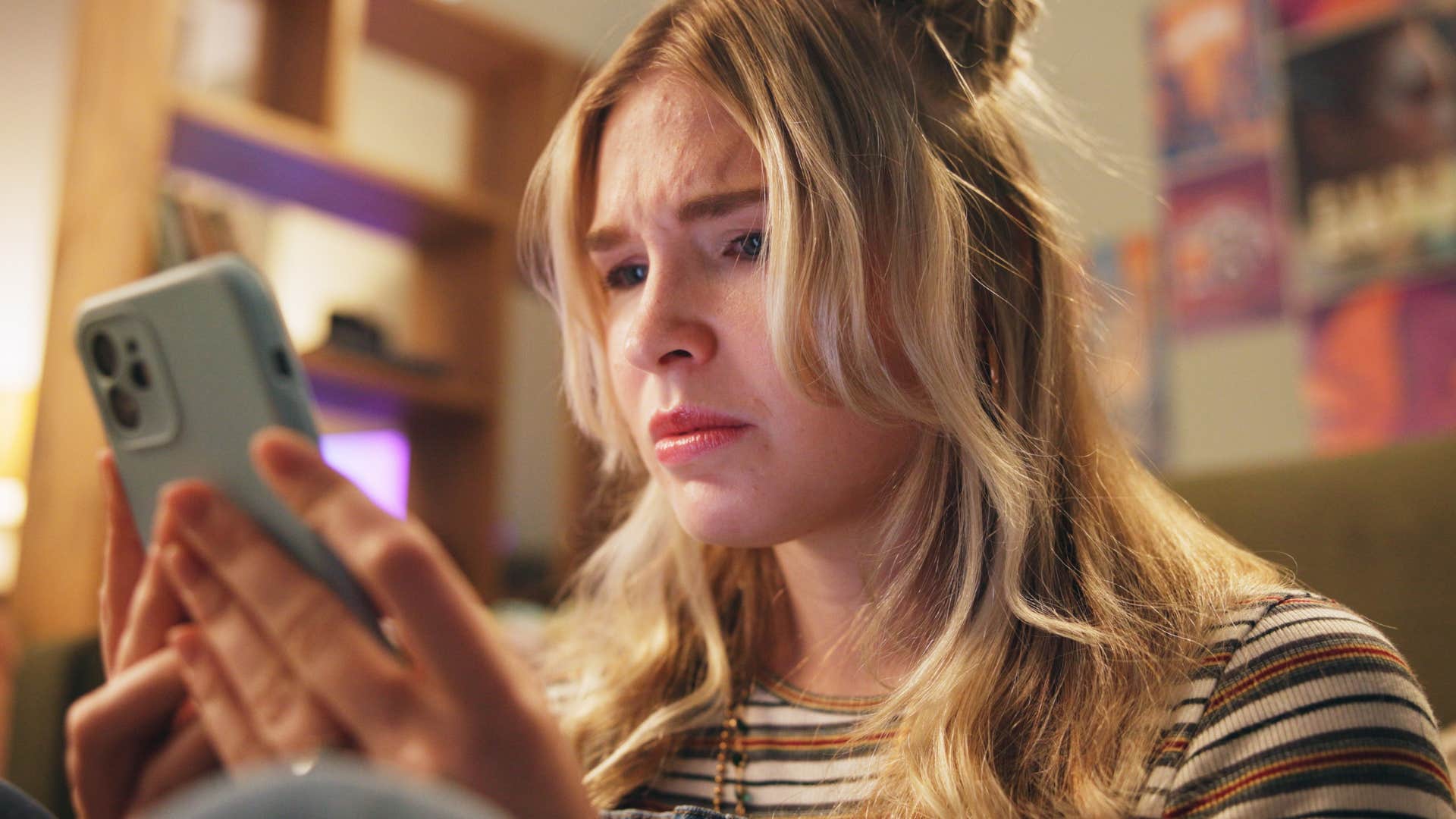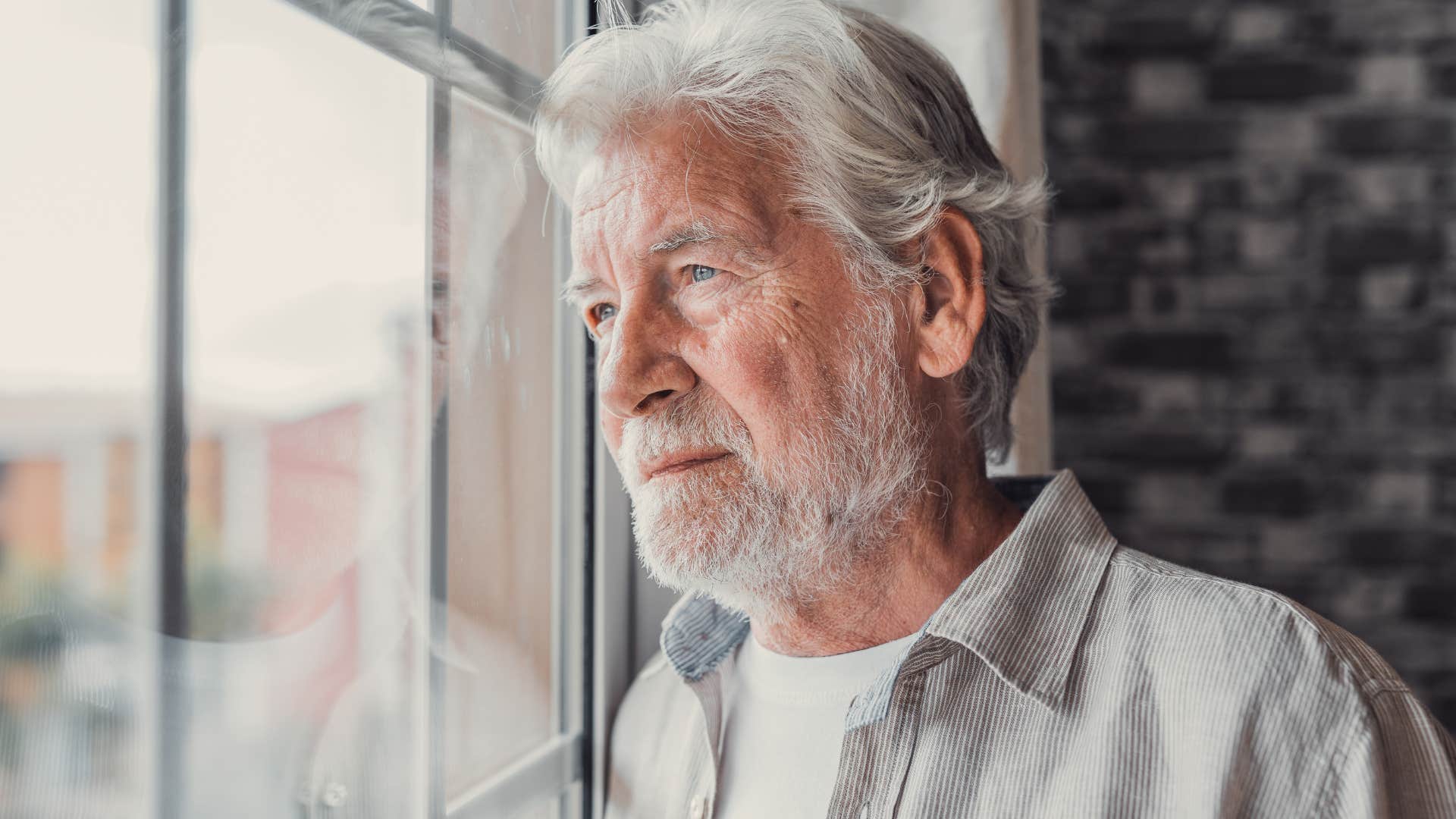11 Sad Truths People Pretend Not To Notice About Their Lives
It may not be easy, but getting real about your struggles is the best gift you can give yourself.
 Krakenimages.com | Shutterstock
Krakenimages.com | Shutterstock There are certain sad truths people pretend not to notice about their lives that negatively affect their well-being, using distractions and toxic habits to shield themselves from coping. Healthy distractions like hanging out with friends or watching a TV show can be incredibly helpful in difficult life situations, according to psychotherapist Nicholas Balasisis, but overindulging in distractions can also encourage people to seek out instant gratification and comfort instead of true healing.
Of course, dealing with the hard truths of life isn’t easy, and we all cope in our own ways and on our own timelines, but at some point, true healing has to come from getting honest with yourself, no matter how uncomfortable that might be. Whether that means seeking out support, investing in healthy relationships, or spending time self-reflecting, honesty is the key to living a more fulfilling and healthy life.
Here are 11 sad truths people pretend not to notice about their lives
1. They don’t trust themselves
 Kateryna Onyshchuk | Shutterstock.com
Kateryna Onyshchuk | Shutterstock.com
According to experts from the University of Colorado, being present in your mind and body can genuinely reduce stress from your life and encourage a more balanced, positive, and healthy state of being. However, many people don’t trust themselves enough to be present, both in their bodies and their minds, contributing to lowered self-esteem, a loss of identity, and worsened relationship health.
One of the sad truths people pretend not to notice about their lives is that they don’t trust themselves or like who they’ve become, and they continuously overshadow their need for personal growth and reconciliation by indulging in distractions, toxic relationships, and poor routines.
Mindfulness and reflection aren’t always comfortable, especially if you have a toxic relationship with yourself, but making space for it in a chaotic routine can rewire your body and mind to find safety in solitude, rather than anxiety and fear.
2. They’re emotionally numb
 Fizkes | Shutterstock.com
Fizkes | Shutterstock.com
It’s certainly true that our current digital landscape, coupled with societal expectations and difficult worldly news, is hurting our collective wellbeing as people, as experts from the American Psychological Association argue. Many people who spend all day on social media or keeping up with headlines fall somewhere on a spectrum between emotionally numb and overwhelmed.
Some people resort to distractions as a coping mechanism for these big and complex emotions, but that doesn’t simply make these emotions go away. It either numbs us from feeling or urges us to suppress emotions that bubble up at unexpected times.
Whether we like it or not, feeling is the key to our humanity. In our relationships, in solitude, and in navigating our lives, our ability to feel and express emotions bonds us with others and encourages us to be grounded in our current reality. Don’t run away from feeling, even if it means getting honest with yourself about what you need to regulate, acknowledge, and heal from the more complicated emotions you face.
3. They seek validation from others, not themselves
 PeopleImages.com - Yuri A | Shutterstock.com
PeopleImages.com - Yuri A | Shutterstock.com
According to social worker Joslyn Jelinek, attention-seeking behaviors are often rooted in unresolved childhood trauma, where adult children failed to have their emotional needs met by their parents early in life. Often perpetuated by low self-esteem and internalized insecurity later in life, people who seek external validation and approval from others are generally coping with their difficult childhood experiences, even if they don’t realize it.
It’s also possible that attention-seeking behaviors are some of the sad truths people pretend not to notice about their lives. Even if they find themselves leaning into toxic relationships, struggling with independent decision-making, or feeling disillusioned when they can’t spark the same kinds of joy that a compliment or attention brings, it’s hard to confront that reality.
So, what’s the key to unlearning this behavior and instead fulfilling yourself internally? Self-compassion. Be there to celebrate your wins, invest in healthy solitude, and work on cultivating self-worth in the ways that work for you, even if it’s uncomfortable at first.
4. They accept less than they deserve
 Dragana Gordic | Shutterstock.com
Dragana Gordic | Shutterstock.com
Are you an accomplice to your suffering? Psychologist Jill P. Weber suggests it’s possible, especially if you’re constantly accepting less than you deserve and tolerating toxic behavior from the people in your life. Of course, it’s easier said than done to set boundaries with other people and even cultivate a sense of self-worth that encourages you to set standards in the first place.
Oftentimes, these behaviors are one of the sad truths people pretend not to notice in their lives, because they’d prefer to have a false sense of control over their relationships and wellbeing by protecting familiarity, no matter how unhealthy and toxic that comfort may be.
Everyone deserves unconditional love, respect, and empathy, and when you tolerate less than that, you’re teaching people how to treat you. So, it’s essential to create standards and craft boundaries, especially to protect yourself from falling into a cycle of toxic relationships.
5. They’re settling in their relationship
 PeopleImages.com - Yuri A | Shutterstock.com
PeopleImages.com - Yuri A | Shutterstock.com
According to relationship coach Celine Remy, you’re only sabotaging your own well-being when you settle for someone who’s not healthy for you. Whether that means tolerating betrayal, avoiding hard conversations and conflict, or setting vague boundaries to protect another person’s ego, settling for someone who treats you poorly is one of the sad truths people pretend not to notice about their lives.
A healthy partner or relationship empowers you to be your best self. From crafting personal goals to nurturing other healthy relationships, having open conversations, and even feeling at peace when you’re alone, the people you choose to keep in your life can play an impactful role in your well-being and health.
6. They have toxic friends
 Fizkes | Shutterstock.com
Fizkes | Shutterstock.com
The people you choose to keep in your life, nurture in relationships, and give access to hold a lot of power over your well-being and success. If you have toxic friends who tear you down, talk poorly behind your back, and dismiss your emotions, it’s your self-esteem and general well-being that’s sabotaged.
Bad friendships can have negative effects on you mentally, emotionally, and physically. Even if it’s hard to come to terms with the end of a relationship or having to get comfortable with being alone, keeping toxic people around only sabotages your room for growth, peace, and stability.
7. They’re wasting time
 MAYA LAB | Shutterstock.com
MAYA LAB | Shutterstock.com
There’s truly no such thing as wasting time if you’re living an authentic life, looking out for yourself, and cultivating happiness or health, but when you put your dreams and aspirations on the back burner, waiting for the right time, you’re not doing yourself any favors.
Whether you’re 20 years old or 80 years old, waiting for the right time to pursue goals and prioritize yourself only encourages you to miss out on opportunities and progress. It’s never too late to start.
8. They’re stuck in patterns of toxic behavior
 Rawpixel.com | Shutterstock
Rawpixel.com | Shutterstock
Whether it’s pushing off a wellness routine, waiting until Monday to finally have that hard conversation, or completely disregarding the need for a routine with a demanding schedule, many of the sad truths people pretend not to notice about their lives are patterns of toxic behaviors. It looks different for everyone, but growing stagnant and putting yourself to the side for the sake of productivity or comfort isn’t doing anyone any favors.
Of course, it’s far from easy to stick to a routine and cultivate healthier habits, but oftentimes, it’s a mindset shift that makes prioritizing yourself that much easier. You don’t have to work out, get outside, eat healthy, or show up as your best self every day. You just have to find things that make you feel good.
Sometimes, it’s going to therapy, giving yourself the grace of rest, or simply going for a walk outside, but no matter what those habits look like, acknowledging that you need a change is the first step.
9. They blame others for their mistakes
 Perfect Wave | Shutterstock.com
Perfect Wave | Shutterstock.com
Blaming other people for your mistakes and never taking accountability is often a facet of people with low emotional intelligence, according to a study published in the Personality and Individual Differences journal, but sometimes it’s simply a coping mechanism. Many people with unresolved trauma, fears of rejection, or even social anxiety may deflect and blame-shift to protect their comfort, even if they recognize it’s a clear method of self-sabotage in their lives.
It’s not comfortable to take responsibility. It’s in our human nature to want other people to perceive us in the most positive way, but the truth is that taking ownership of our shortcomings actually breeds more respect and connection than deflecting does.
10. They want a different life, but don’t change
 Bricolage | Shutterstock.com
Bricolage | Shutterstock.com
Many people living a life they’re not proud of or passionate about expect things to change without work. They believe opportunities, people, and success will come their way, even when they’re not doing anything different. It’s a hard reality to face, but it’s often the truth: nothing changes if you don’t.
It’s one of the sad truths people pretend not to notice about their lives, especially alongside chronic stress, anxiety, and a million responsibilities piling up in the back of their minds. Of course, life isn’t easy, and there’s usually a million things going on, from work stress to financial struggles and family drama, but to embrace change, you have to shift and evolve yourself.
11. They chase people who aren’t meant for them
 Dragana Gordic | Shutterstock.com
Dragana Gordic | Shutterstock.com
Outside of settling for people undeserving of their affection and pretending not to care to build emotional walls, many people can’t help but chase people who aren’t meant for them. Whether it’s rooted in low self-esteem, childhood trauma, or another toxic experience, many people chasing relationships and opportunities that aren’t meant for them actually miss out on the things that are.
Even if it’s uncomfortable, we have to focus on ourselves to find the people and things that are meant to add value to our lives. You can’t live your life shape-shifting into different identities and personalities to seek approval or acceptance from others. If that’s you, and you probably already know deep down if it is, give yourself the grace of personal empowerment, instead of trying to fit a certain narrative or mold.
Zayda Slabbekoorn is a staff writer with a bachelor’s degree in social relations & policy and gender studies who focuses on psychology, relationships, self-help, and human interest stories.

